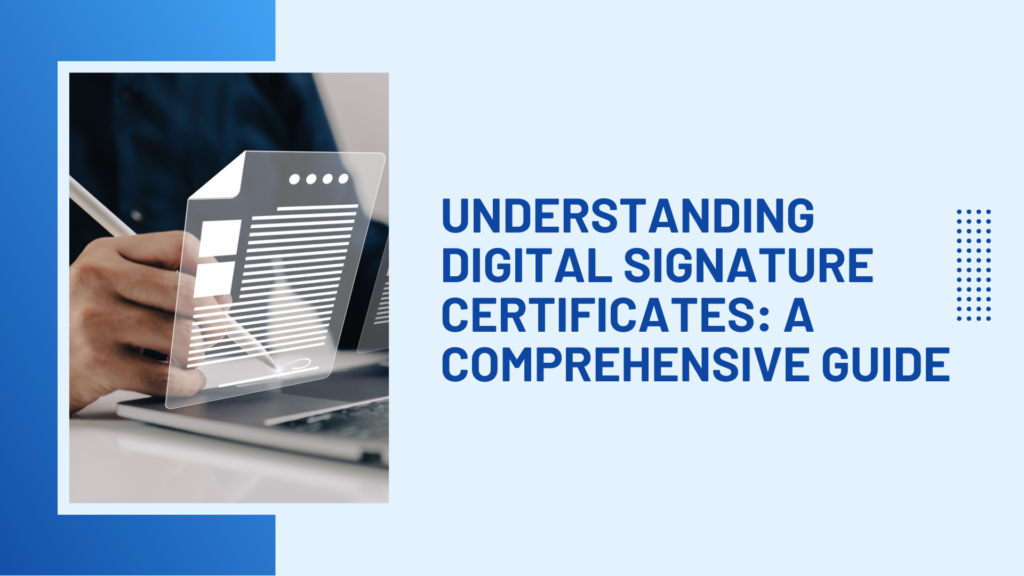Understanding Digital Signature Certificates: A Comprehensive Guide

Understanding Digital Signature Certificates A Comprehensive Guide
In today’s digital age, security and authenticity are paramount, especially when dealing with sensitive information online. One of the key tools used to ensure these aspects is the Digital Signature Certificate (DSC). This article delves into what a Digital Signature Certificate is, how it works, its benefits, and its applications.
What is a Digital Signature Certificate?
A Digital Signature Certificate is a type of electronic signature used to authenticate the identity of individuals and entities in digital communications and transactions. It serves as a digital equivalent of a handwritten signature or a stamped seal but with the added benefits of encryption and authentication. DSCs are primarily used to secure email communications, online transactions, and legal documents by providing a mechanism to verify the signer’s identity and ensure that the document has not been altered after signing.
How Does a Digital Signature Certificate Work?
At its core, a Digital Signature Certificate employs a combination of public-key cryptography and hashing algorithms to ensure security. Here’s a simplified overview of how it works:
Key Pair Generation: A digital signature is based on a pair of cryptographic keys: a private key and a public key. The private key is kept secret by the owner, while the public key is distributed openly.
Hashing: When a document is signed digitally, a hash function generates a fixed-size hash value (a unique fingerprint) of the document’s contents. This hash value is a representation of the document’s content.
Encryption: The hash value is then encrypted using the signer’s private key. This encrypted hash value, along with the hashing algorithm used, forms the digital signature.
Verification: To verify the signature, the recipient decrypts the digital signature using the signer’s public key to obtain the hash value. They then compute the hash value of the received document and compare it with the decrypted hash value. If they match, the document is verified as authentic and unaltered.
Benefits of Digital Signature Certificates
Digital Signature Certificates offer several advantages over traditional paper-based signatures:
Enhanced Security: Digital signatures provide a higher level of security through encryption. The use of private and public keys ensures that the signature cannot be forged or tampered with.
Authentication: DSCs authenticate the identity of the signer, making it clear who signed the document. This is crucial in preventing identity fraud and ensuring that only authorized individuals can access or approve documents.
Integrity: Digital signatures ensure that the document has not been altered after signing. If any changes are made to the document after it has been signed, the digital signature becomes invalid.
Non-Repudiation: Once a document is signed digitally, the signer cannot deny having signed it. This feature is particularly useful in legal and financial transactions where evidence of agreement is required.
Efficiency: Digital signatures streamline the signing process, eliminating the need for physical paperwork. This leads to faster transactions, reduced administrative overhead, and cost savings associated with paper, ink, and postage.
Applications of Digital Signature Certificates
Digital Signature Certificates are used in a variety of contexts to ensure security and authenticity:
Legal Documents: DSCs are widely used for signing contracts, agreements, and other legal documents. This not only ensures the authenticity of the document but also simplifies the signing process, especially in remote or international transactions.
Financial Transactions: In the financial sector, digital signatures are used to authorize and verify transactions, such as online banking operations, loan applications, and investment agreements.
Government Services: Many government services require digital signatures for filing tax returns, applying for licenses, and submitting various forms. This facilitates efficient processing and reduces bureaucratic delays.
Email Security: Digital signatures can be applied to email messages to verify the sender’s identity and ensure that the message has not been altered during transmission.
Software Distribution: Software developers use digital signatures to sign software and updates. This assures users that the software is genuine and has not been tampered with since it was released by the developer.
Types of Digital Signature Certificates
Digital Signature Certificates are categorized into various types based on their use and the level of security they provide. Here’s an overview of the most common types:
Class 1 Digital Signature Certificate: This is the most basic type, primarily used for personal or individual use. It verifies the email address of the user but does not offer high-level security. This type is typically used for accessing email accounts or simple online transactions.
Class 2 Digital Signature Certificate: This type is used for higher-level security and is commonly required for online forms and documents that require a more robust verification process. It verifies the identity of the individual against a database of official records, making it suitable for the e-filing of taxes and other official applications.
Class 3 Digital Signature Certificate: This is the highest level of digital signature security, used for critical transactions that demand the highest level of assurance. Class 3 certificates require in-person verification of the identity of the individual or entity. They are often used for online bidding, e-tendering, and other sensitive transactions.
Also Read, Buy Digital Signature Certificate Online
Conclusion
Digital Signature Certificates represent a significant advancement in the realm of digital security and authentication. They offer enhanced security, authentication, integrity, non-repudiation, and efficiency compared to traditional signatures. As digital transactions and communications continue to grow, the importance of DSCs in safeguarding information and verifying identities cannot be overstated. Understanding and utilizing Digital Signature Certificates is crucial for anyone involved in digital interactions, whether in legal, financial, or governmental contexts. By adopting DSCs, individuals and organizations can ensure a higher level of security and trust in their digital dealings.





